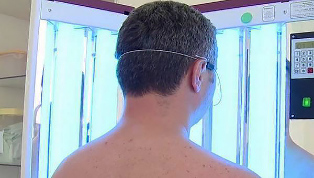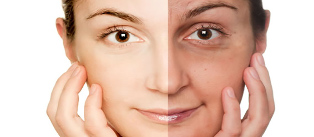This type of disease, such as psoriasis it is able to deliver a lot of problems to its owner, as well as its manifestations outside, certainly, imposes its mark on the quality of life of the patient. In addition, psoriatic plaques are accompanied by itching and burning, which worsens the situation.

The disease is chronic long and hard enough and time to heal. In winter, cutaneous manifestations, you can hide under clothing, but with the arrival of the summer season, when it is provided for seaside holidays, many women and men concerned with the question whether it is possible to get a tan in the sun when the psoriasis and how the sun affects the development of the disease?
Are compatible if the sun and the psoriasis?
As a general rule, the psoriasis is more fast passes exactly in summer, the period of time. It is more likely that this explains which exerts the influence the water of the sea, the air and the sun. During the summer the state of the skin covering the patient improved markedly, as well as the exposure to the ultraviolet rays inhibit the development of pathological processes on the surface of the skin.
Recently, more and more, the focus is on the close relationship of psoriasis and the amount of vitamin D in the body of the patient. Everyone knows that vitamin D is given to children at a young age, as a preventive measure against the development of rickets.
However, few know that lack of vitamin D in the blood of patients suffering from psoriasis (especially in cold weather, of course), contributes to the worsening of the disease.
For this reason, dermatologists recommend taking baths of sun, as well as exposure to ultraviolet radiation contributes to the rapid regeneration of the skin with the plates, as well as the healing of open wounds.
However, one must remember that the sun bath should be dosed, therefore, it is recommended to take the sun in specific times, in order not to cause burns on the skin. In consequence, psoriasis refers to the auto-immune diseases, when it is tan, there is the risk of developing cancer of the skin with premature aging of the skin.
You must consider that there is a minimum of 5% of patients who suffer from part of the way of skin psoriasis. Often, the patients of psoriasis accompanied with synchronous allergic skin lesions that arise as a result of an increased sensitivity to the sun. These patients, on the contrary, recommended to be protected from the sun's rays.
The rules of admission to the sun
When psoriatic arthritis manifestations should take baths of sun, only after consulting your doctor. On the first day of holiday by the sea you can sunbathe no more than 10 minutes. Next duration of sunbathing, you can increase. However, the total time of exposure to the sun should not exceed one hour.
The sea is recommended to take the sun in the morning (from 5 to 11 hours) and afternoon (16 to 20 hours). The most dangerous interval of time between 12 hours and 14. It is a time of sun, the more actively, whenever possible, you should avoid direct contact with sunlight. In addition, you can defend from the sun through protective creams and lotions.
Psoriatic plaque, it is advisable to treat of ointments, which include activated pyrithionine of zinc.
By cons stay in the sun open refers to the need to use sunglasses, lotions and creams, as well as most outdoor drugs, which include components, able to sharpen the symptoms when the psoriasis. Additives components are able to interact with other drugs, assignable to relieve the psoriatic plaques.
Therefore, glasses drugs should select a dermatologist, because many of them have side actions and require an individual approach to the patient.
The beneficial properties of the sun, when the psoriasis
The rays of the sun have the following effect on the skin when the psoriasis:
- ultraviolet has slow eliminate the effect of the upper layer of the epidermis;
- the sun causes the body to strengthen the defenses;
- active tissue regeneration;
- reduces flaking and formation of psoriatic plaques;
- relieves the itching.
The sun can contribute to the thickening of the skin, which increases the flow of oxygen in the lymph with the accompaniment of a long remission.
The possibility to use the solarium, when the psoriasis
Artificial ultraviolet light very effectively it is applied to patients with psoriasis, especially in winter.
UV procedure can be used in two ways:
- UVB. In this case, are used ultraviolet rays of short waves.
- PUVA. In this form of use wavelength radiation with photosensitizers (Psoralens) of natural origin.

The use of a solarium in the treatment of psoriasis, today refers to the people forms of treatment and is expressed as follows:
- as a result of exposure to ultraviolet rays, occurs the production of endorphins (hormone of happiness), which reflects positively on the CNS;
- the solarium is capable of removing the acute symptoms of manifestations on the skin;
- when you receive a tan artificial, occurs the production of vitamin D, which counteracts the nervousness and the state of stress in the body. These indicators refer to the one of the causes of the development of the disease.
Recommendations to visit the solarium
In the first place, one should consider that the use of the solarium, as well as the sunbathing can not replace the full treatment when the psoriasis, so before you begin to use these procedures, it is recommended to consult a dermatologist.
It is necessary to respect the following conditions:
- do not go to a solarium in the acute phase of the disease, as well as the sick body weakened and has high sensitivity in the skin, which can cause burns on the skin;
- for the treatment of the disease of preference, choose a solarium vertical, which is more efficient than the horizontal;
- to keep in the photo-booth can be no more than 6 minutes;
- it is best to attend the solarium after a day;
- the course of treatment with the deposits may not exceed 25 sessions for 5-7 minutes.
It is important to consider that some medicines and cosmetics are able to give rise to an allergic reaction that, in the future, lead to an increased sensitivity of the skin to the Solarium and the sun. Therefore, before you visit the solarium, as well as a trip to the sea, it is necessary the consultation with your doctor.
Prevention
In the treatment of the sun, there are the positive and negative sides. Despite its useful properties, the ultraviolet rays when improperly, can cause burning of the sun, in the form of watery blisters on the skin. This condition leads to an increase of the itching. In consequence of this, enough to can often occur the accession of secondary infection. In addition, the light almost dehydrate the skin, causing premature aging and the formation of benign lesions and malignancies.

When the photo-sensitive psoriasis phototherapy should be performed under the supervision of a specialist. In other cases, you must respect the moderation. More lends itself well to solar therapy teardrop-shaped form of psoriasis, which explains the minimum of eruptions on the skin.
It is recommended to take the sun in doses best in the morning and evening, avoiding the aggressive action of the sun. In the case of relax at sea is not possible, you can replace it a vacation more close to the reservoir, with all the safety rules.
It is important to remember that phototherapy, as well as all the therapeutic treatments, should only be performed after consultation with the doctor. She is able to cause the manifestations negative on the skin.























